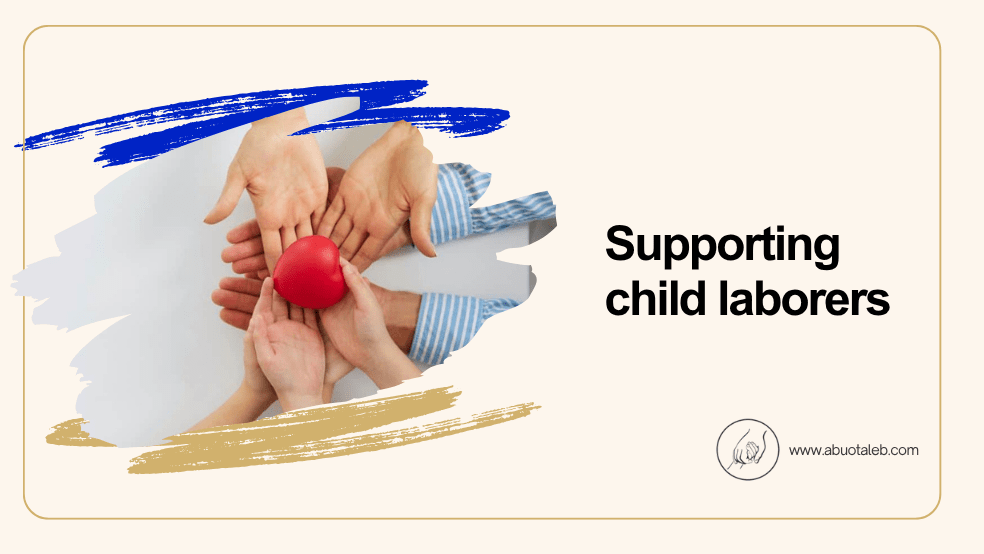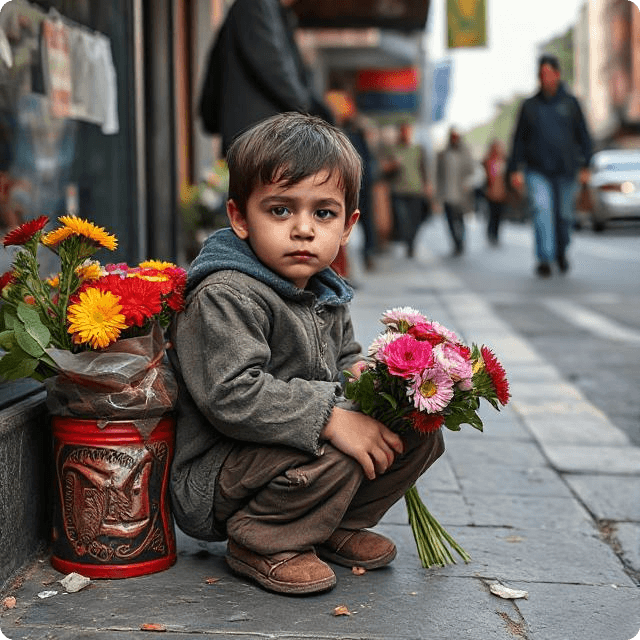No products in the cart.
Supporting child laborers
The innocent faces of children who, instead of playing, carry the burden of life, are not rare in different cities of Iran. In fact, these children, who are called child laborers, are children who are under the age of 18 and are constantly forced to work. Helping child laborers in Iran has always been one of the concerns of people, especially in large cities.
The reasons for innocent children working in Iran are various and include poverty, family problems, and abuse. In this regard, associations called child labor support organizations or child labor support associations are mostly created either by institutions or by people.

Our most important activities at the Abutaleb Charity Foundation

Educational support
Providing stationery, textbooks and holding training classes

Livelihood support
Distributing clothing and essential items to children and their families

Empowerment support
Holding skills training courses to create jobs in deprived areas

Cultural activities
Holding skills training courses to create jobs in deprived areas
Support line
Join us with your heart and strength. An opportunity to make an impact, learn, and build a brighter future for children. Volunteering with our organization is an effective step on the path of charity and changing the lives of those who need our support.
What services do we provide?
Answers to your most frequently asked questions
Is it right to help working children?
Children are forced to work for various fundamental reasons, and buying or not buying from them does not solve the root problems; the best support is for people to at least not make their situation worse, and it is better for these tasks to be carried out by relevant organizations and institutions.
How to help child laborers?
Help improve the situation of child laborers by supporting reputable organizations active in the field of children’s rights and reporting cases of exploitation.
What are the essential needs of working children?
The essential needs of working children include: security, education, health, proper nutrition, psychological support, and freedom from exploitation.
Sponsored child
1200
+
assistant
100
+
Sponsor
100
+
Which categories of children are child laborers?
Child labor in different societies has different types. These types can be different in urban and rural children. For example, children working in farms who are mostly engaged and seen in villages. Or children who are engaged in street vending in cities. In the rest of this text, we will discuss the types of child labor, especially child labor that is mostly seen in cities.
Child labor with family: These children are in a better situation compared to other child laborers; they go out of the house to work and return to their family and home after work.
Children belonging to street families: This group of children live on the streets with their families and work alongside other family members.
Street child labor: This group of child laborers is the most vulnerable group because the street is their place of residence and they are also deprived of having a family. These children either live in small houses without facilities or spend their time among other street child laborers.
It should be noted that the Child Labor Charity strives to free these children from the exhausting cycle of work and provide them with the opportunity to enjoy their basic rights through various forms of support.

What are the problems of child labor?
The main problems of child laborers include deprivation of education that threatens their future, serious risks to physical and mental health caused by harsh working conditions and exploitation, as well as the loss of childhood and basic rights such as play and recreation. The lack of adequate legal and social protection also makes these children more vulnerable to harm and makes it difficult to escape this cycle.
Deprivation of education also jeopardizes their future and limits their opportunities for growth. The serious risks to physical and mental health caused by hard work cause them lasting harm. These children are also deprived of their childhood and basic rights and struggle with various psychological and emotional problems, including anxiety, depression and lack of trust. Financially, they and their families are in extreme poverty and do not have enough money to survive.

What is the best way to help child laborers?
There are various ways to help working children. These methods, which include educational support, financial assistance, psychological support, and non-material assistance, help improve the lives of these children. We will introduce these methods below.
Academic support
Providing educational opportunities for working children allows them to gain knowledge and skills to build a better future for themselves and escape the cycle of poverty. This support includes providing education and educational assistance, which is usually done well by associations supporting working children.
Financial assistance
Providing financial assistance and support to working children and their families can reduce economic pressure and the need for their children to work. This assistance should be tailored to the family’s circumstances and aimed at empowering them.
Psychological support
Child laborers often face psychological and emotional trauma. Psychological support includes providing counseling services and creating safe spaces to improve their mental health and cope with traumatic experiences.
In-kind donations
In-kind assistance, which is one way to help child laborers, includes providing basic needs such as clothing, food, health services, shelter, as well as legal protections and recreational opportunities to improve the quality of life of child laborers.

What can we do to support child laborers?
In response to the question of how to help child laborers, it should be said that supporting child laborers is done in many ways, and we will introduce various solutions for child laborers below:
- Paying attention to the dignity and personality of child laborers: The first and most important step in dealing with and supporting child laborers is paying attention to their dignity and personality as valuable human beings. Despite their difficult living conditions, these children need respect, empathy, and understanding. Any interaction should be conducted in a kind and respectful tone, and behaviors that may make them feel inferior or ashamed should be avoided.
- Do not pity: When dealing with child laborers, do not pity them. Pity, although it may come from good intentions, can reinforce the child’s feelings of weakness and helplessness and damage their self-esteem.
- Avoid posting images and videos on social networks: Unfortunately, it is sometimes seen that some people or media use images and stories of child laborers to attract public attention or for their own specific purposes. This is not only unethical, but can also seriously damage the privacy and dignity of these children. Protecting working children requires preserving their privacy and avoiding any dramatic exploitation of their situation.
- Feeding them with fresh, homemade food: This not only meets the nutritional needs of children to some extent, but also shows consideration and care for their health and well-being.

What is the mission of Abutaleb Child Labor Charity?
In response to the question of how to help working children, it should be said that the Working Children’s Charity, such as the Abutaleb Working Children’s Charity, carries out various measures in the field of supporting and advocating for working children, with the aim of improving the lives of these children and empowering them. The tasks of the Abutaleb Charity’s services and programs include returning children to education, training working children, and preventing child labor, which we will explain more about the tasks of the Working Children’s Charity below.
| Duties | Description of Duties |
| Reintegrating Working Children into Education | Providing access to education and facilitating the return of working children to school to help them build a better future. |
| Skills Training for Working Children | Offering vocational and technical training to empower working children and create future employment opportunities. |
| Prevention of Child Labor | Working to prevent children from entering the labor market through awareness campaigns and support for vulnerable families. |
Factors influencing the emergence of child labor
The emergence of the phenomenon of child labor is rooted in several factors. Poverty and lack of money, as the most important factor, put families in economic difficulties and force them to send their children to earn money. Also, the large number of children in some families reduces the ability of parents to meet living expenses and makes child labor a survival strategy for child laborers. On the other hand, the financial benefits of employers, which are obtained by paying children lower wages than adults, increase the incentive to hire them.
In addition to economic factors, cultural and social issues also play a role in the formation of this phenomenon. The cultural poverty of society and the disregard for children’s rights by some individuals and institutions provide the basis for the exploitation of children. The loss of the head of the family and the source of income directly enters the labor market so that they can provide for themselves and their families. Also, the rejection of the child by the family and those around them and the children’s escape from family problems can lead them to the streets and expose them to work.

Laws protecting child laborers
According to Article 79 of the Labor Code and in line with the “Protection of Child Labor” laws, employing persons under the age of 15 is prohibited and considered a violation. Employers who employ such children for the first time will face a fine. If this violation is repeated for the second time, according to the “Helping Child Labor” law, in addition to a fine, they will also be subject to imprisonment. For the third and subsequent times, in addition to a fine and imprisonment, the offending factory or workshop will be sealed and the individual’s license will be revoked.
Of course, there is a note in this law that excludes workers employed in family workshops (whose employers are spouses or first-degree relatives) from the scope of this law. Therefore, in these types of workshops, compliance with the minimum working age is not mandatory.




